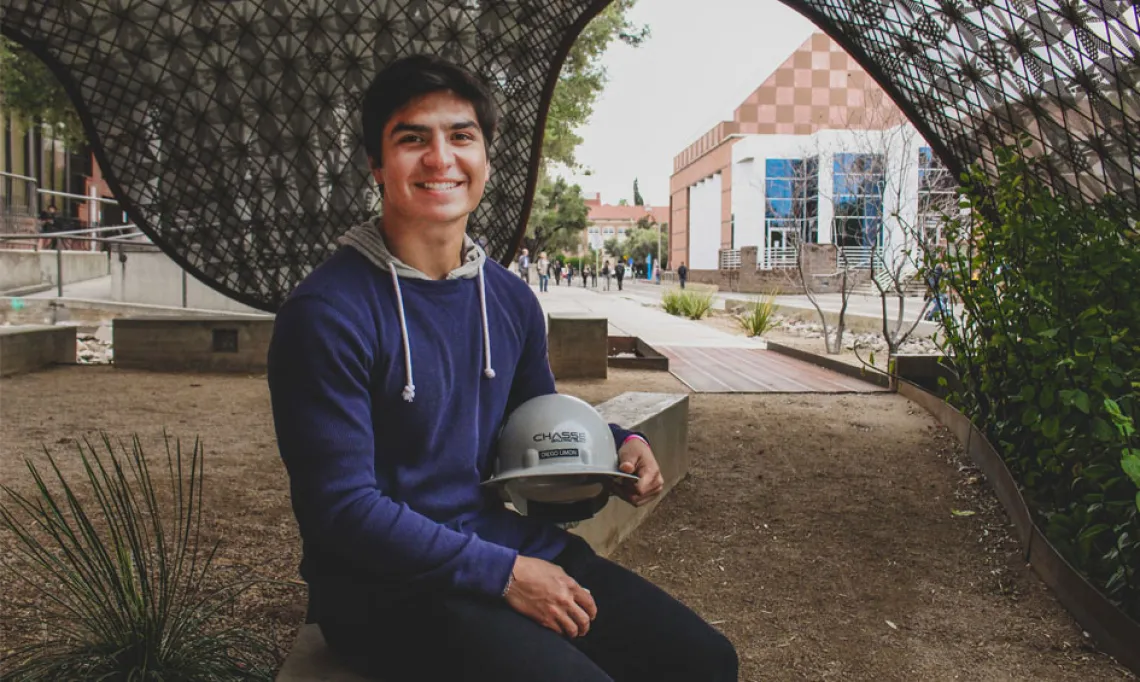Building Experience in the Field: Diego Zell ’23 B.Arch
CAPLA Job Interview Fair Helps Architecture Student Land Internship

When Diego Zell ’23 B Arch came to the University of Arizona to study architecture, his days working at the Levi’s Outlet Store in Tucson Premium Outlets were behind him. Little did he know that his first internship as an architecture student would be with the company that built that outlet mall: Chasse Building Team.
“It was their first project in Tucson, and that connection is pretty cool,” says Zell, who spent the summer of 2019 and a month over the 2019-2020 winter break interning for the construction company.
How did Zell land a paid internship before finishing his foundation year in the program?
“In truth, I figured I wouldn’t have much luck,” he says. But classmates in their second year suggested he participate in the College of Architecture, Planning and Landscape Architecture’s Job Interview Fair—held this year on February 7, 2020—and advisors gave him tips on creating an architectural resume and portfolio.
Though Zell didn’t have the skillset of more advanced students, he was eager to demonstrate that he was proficient at another critical skill. “Foundation year doesn’t correlate with pre-construction and project management technical requirements,” he says, “but we learn early on how essential it is to manage our time well.”
Zell had a good conversation with Chasse representatives in the Sundt Gallery during the job fair and was invited for a second interview in their Tucson office, where they offered him the internship.
“They asked whether I wanted to work in the office or in the field,” he says. “I was thinking of architecture so said the office.” But when they told him he’d be surprised how much he would learn in the field, he took up their offer to work on a project Chasse planned to complete that summer—the Dove Mountain CSTEM K-8 School, an innovative, 102,755 square-foot facility valued at $28 million.
“When I got there I was overwhelmed,” he recalls. “The full engine was running, but I didn’t even know how to read construction documents.”
Kyle Harrison, Chasse’s project superintendent, guided Zell through those first days and throughout his internship—and so did fellow CAPLA student Brent Potter ’20 B Arch and CAPLA alumna Gabrielle Robinson ’17 B Arch, a Chasse project engineer. “They taught me so much: how to read documents and use software; how to make a punch list and go through punch walks. I was surprised just how intricate the process is.”
Fluent in Spanish, Zell was also able to work with many of the subcontractors. Indeed, a family friend suggested that “if you want to be an architect, you should work in construction first because the subs will appreciate you a lot more.”
Though he learned a lot in his internship, the most rewarding part of the experience was the working environment. “It’s a Chasse family,” he says. “They are very supportive and friendly, with a real personality. I don’t know what there isn’t to love about interning there.”
As for other first-year CAPLA students looking for an internship, Zell uses his own example: “It’s never too early—you just have to be willing to try. If you want an opportunity and are open to learning, people will teach you. It’s good for you and it’s good for them.”
CAPLA students, learn about registering for the Job Interview Fair.



